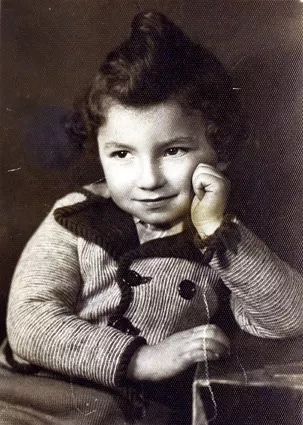Gucio Feldman during the war
This is my nephew Gucio in 1941. The photo was taken by a professional photographer in Warsaw or Lublin. He is wearing a Tyrolean style suit. I remember that before the war I was given a costume in the same style, gray with green stripes, with red and white lining, Tyrolean lapels, and buttons. When I went out on the street in that costume, a woman said: "Well, well, a Jewish broad wearing this?!"
My sister got married in 1937. I don't know how they met, they dated for a short time. His name was Abram Feldman and my sister renamed him Adam, though at the beginning she did call him Abram. I know very little about him, because he was from Radom. After the wedding, my sister and her husband went to Lublin. In 1937 or 1938, more likely 1938, my nephew Gucio was born. He was born in Warsaw, because it was a complicated delivery. Then they went to Lublin, but not right away. They stayed in Lublin until the war.
In September 1939 my sister's little son moved in with us, because at the time [when the war broke out] he was spending his holidays in Srodborow with my mother. So my mom walked back to Warsaw with this child in her arms under the falling bombs. I remember she told me how she walked across the bridge with him, scared to death.
Then I went looking for my sister and my brother-in-law. I went to Bialystok [a town in north-east Poland, approx. 200 km from Warsaw], because everybody who was leaving went through Bialystok. The cafes in Bialystok were all covered with slips with names written on them. One of those slips told me my brother-in-law and my sister were in Luck. From there they were planning to go to Lwow, because my brother-in-law wanted to look up his brother, who was somebody important in the Soviet army. I stayed with them for a month and then signed up to go back to Warsaw-with my sister, because, after all, her child was there without his mother.
At the Russian-German crossing-there was no special border there, only a table where Germans sat on the one side and Poles on the other-my sister tried to cross with me. Everything was going well, only when you took a step forward you heard 'Jude raus!' [Ger.: 'Jew - out'] and then shots in the air. She couldn't take it; she pulled her hand out of mine and ran back. She hid somewhere in a kennel or sty and landed up back in Lublin. She went back to Lublin, because that's where they used to live. I crossed and went back home to Warsaw. My mother was very surprised, because I should have stayed on the other side. Then my sister reappeared, a few months later, infested with lice. It was terrible. That was a very difficult time. She escaped from Lublin because it was even more dangerous there. So she stayed with us for a while with the child; then she left again and the child stayed behind. He was 2 years old then, maybe 2 and a half. He couldn't say 'ciocia' [Pol.: auntie], he said 'Tuta,' so I was 'Tuta.' Then a Polish woman was supposed to come and pick him up. My friend Marysia told me that apparently on the tram he asked her: 'When is that shikse coming?' There was always a bit of laughter in everything. 'That shikse' did come, and took him to Lublin.
I got out of the Warsaw Ghetto in September 1942. I hid a few pictures in my purse: my mom's, my brother's and sister's, her son's (this one) and my own. At first I was in hiding in Warsaw, then in Konskowola [around 100 km south-east from Warsaw] at the home of a woman called Zaba, one of my brother’s friends.
When I was there I still got messages from my sister. She was taken from Lublin to Majdanek. From Majdanek she apparently sent me a diamond, through a man who undertook to give me some of the money for that diamond. For a while that was the only money Zaba and I had to support ourselves. In the meantime, my sister's husband-who they didn't take to Majdanek and he was still in Lublin-wrote to me asking if Zaba could organize a hiding place for him. It was hard to read what he said, he'd gone completely crazy. He was wealthy. If he'd given her some money, maybe Zaba would have managed to help. But he only liked making money and didn't know how to use it. Sometime earlier my sister wrote us that we should remember about this man who could save her husband. So Zaba and I went to Lublin, which was rather dangerous as we later found out. The man said he didn't know my brother-in-law, though he was wearing my brother-in-law's jacket… I recognized it because I had a jacket from the same cloth (the one my sister is wearing on this photograph). It's all so strange. My brother-in-law really had a chance of surviving: he didn't have black hair, he had brown hair and blue eyes, he spoke Polish well. I'm not even talking about the rest of his family but himself. Because he was basically alone by then. His little son Gucio and my sister died in Majdanek, the child before her. I figured that out from the letters I got from my brother-in-law: there was no mention of the child.






















